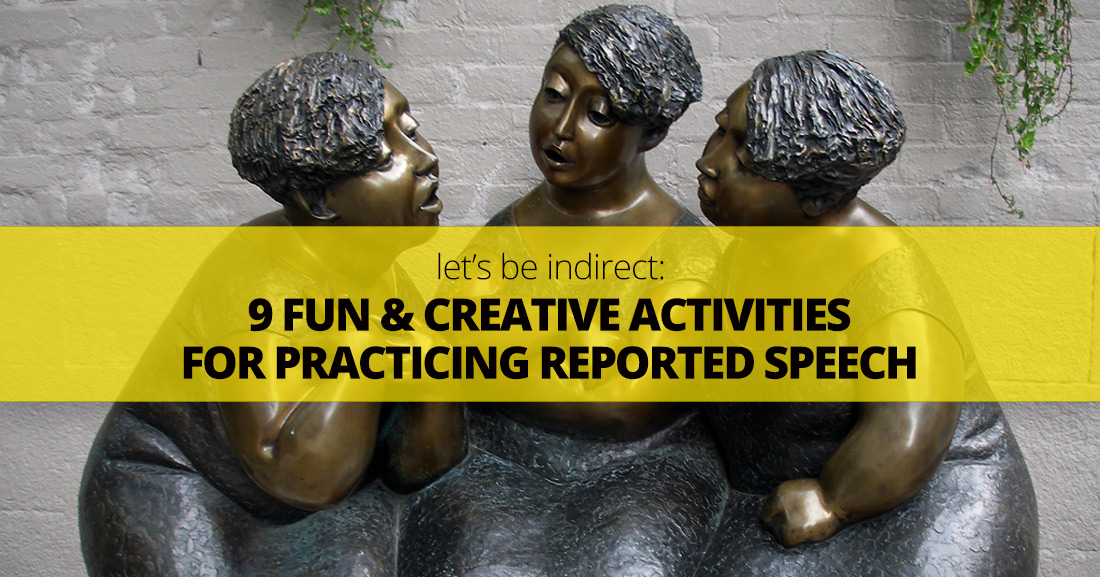And You Can Quote Him: Backshifting in Reported Speech and What You Need to Know About It


They help English speakers understand exactly who said what. Sometimes the words are direct, or quoted. Other times they are coming through an intermediary. A tells B what C said. This kind of speech, the kind that isn’t quoted directly, is referred to as indirect speech. It’s also called reported speech. And it’s not exactly instinctual for English language learners. That’s why it’s always good to have a few reported speech activities on hand. When you’re in need of one, the following are fun and a little bit out of the ordinary, but they still get the job done.
Though individuals go through plenty of changes as they age, many suffer hearing loss. Your students will have fun with this role play in which one person plays a grandparent with hearing loss and another plays the grandchild who must repeat everything for the grandparent. Choose a scenario that ties in with what you are currently teaching in class, for example sports, food, travel, etc. Assign someone to be the grandparent and another to be the grandchild. Then add a third person to the role-play who fits into the theme – a waiter, a sports announcer, a travel agent, etc. The grandparent and the third member of the group will have a conversation, but the grandparent won’t be able to hear anything the third person says. The grandchild must repeat everything for the grandparent using reported speech. Encourage your students to have fun and be creative and, of course, raise their voices so they can be heard.
I heard that she said that…those words normally mean trouble for anyone associated with them, but not so when you are practicing reported speech. As students mingle and spread fictional gossip in this activity, they will get the chance to practice using reported speech in English. To prepare for the activity, make up quotations for each member of your class – words that they have supposedly overheard in social settings. If you like, have them all center around a mystery such as who stole the school mascot. Divide the cards and give one to each member of the class. Then give them time to mingle and share the gossip from their card with their classmates using reported speech and starting with phrase such as, “I heard that she/he said…” Give everyone enough time to talk to most if not all the members of the class, and then see if anyone can determine what really happened based on the things their classmates told them.

Not all activities practicing reported speech have to be speaking activities. You can set up a simple game of memory using direct quotes and their associated reported speech. Start by writing five to ten sentences in direct speech, each on its own index card. The game will be more challenging if these sentences are very similar and only differ in the verb tense or the pronoun used. Then write sentences using indirect speech on five to ten separate cards. Shuffle the cards together and lay them in a grid face down on the table. Students play against a partner to find the most matches for the sentences. To keep a pair, they must match the direct quote with the correct reported speech.
This role play between doctor and patient is perfect for when you are using the conditional form in reported speech. One person plays the doctor who is giving advice to her patient using the conditional form. For example, “If your knee hurts when you move it, don’t move it.” The patient then repeats the doctor’s instructions using reported speech. “So you’re saying if my knee hurts I shouldn’t move it.” Have the doctor give the patient at least five pieces of advice which the patient then repeats. Then have students switch roles.

Have you ever been so mad at someone you wouldn’t talk to them? That’s the scenario for this role-play. Two students are so mad that they are giving each other the silent treatment. They can be playing two friends, a husband and wife, an employer and employee, or any other match up you choose. The third member of the role-play is the intermediary between them. Have the first two people sit far enough away from each other that they can’t hear what the other is saying. Then have the third person relay messages between them using reported speech as the two parties try to work out their differences. Once the parties come to an agreement and are reconciled, give students another scenario and let a different student play the intermediary.
In this activity, each person in class will offer up a piece of advice for a difficult situation. Tell your class the situation that they will give advice for: a friend wants to leave their spouse, a student thinks they will fail a course, a child has to tell their parents they were arrested, etc. Each member of your class gives one piece of advice to the person while the rest of the class writes down what their classmate said. Once everyone has given their advice, each member of the class shares the two to three best pieces of advice offered by the class. They must share the advice again using reported speech such as, “The best advice was when Kylie said the kid should just be honest.”
For this fun activity, write a list of superlative adjectives on small slips of paper and put them in a bag. Write several people your students probably know (their mother, sibling, teacher, best friend, etc.) on small slips of paper and put them in another bag. Each person takes a turn pulling one slip of paper from each bag and then putting those words into the following sentence: the … thing …. ever told me was….” For example, “The funniest thing my mother ever told me was…” That person must then share their answer with the class using reported speech.
With your class, brainstorm a list of occasions they have probably experienced, for example a birthday, a graduation, a Sunday morning, etc. Then have each person share with a partner something someone told them on one of those occasions (using reported speech) without revealing what the occasion was. For example, “My mother told me I was the smartest person there in her mind.” The second person must then try and guess what occasion that statement was said on. Once they guess correctly or get the answer wrong three times, students switch roles.
Assign each person in your class to a partner for this conversation activity. One person stays seated while the other person mingles with the other minglers in class. The seated person asks his partner to find someone who…. for example, knows how to speak Spanish, used to have a dog, etc. Once the mingler finds someone who meets the criteria, she returns to her partner and reports what the class member said e.g. MinYoung said she used to have a dog. The two players then switch roles and the sitter becomes the mingler. Students continue to switch roles and talk to their classmates until time is up.
Get creative with your class and these fun reported speech activities and you’ll all have a great time.